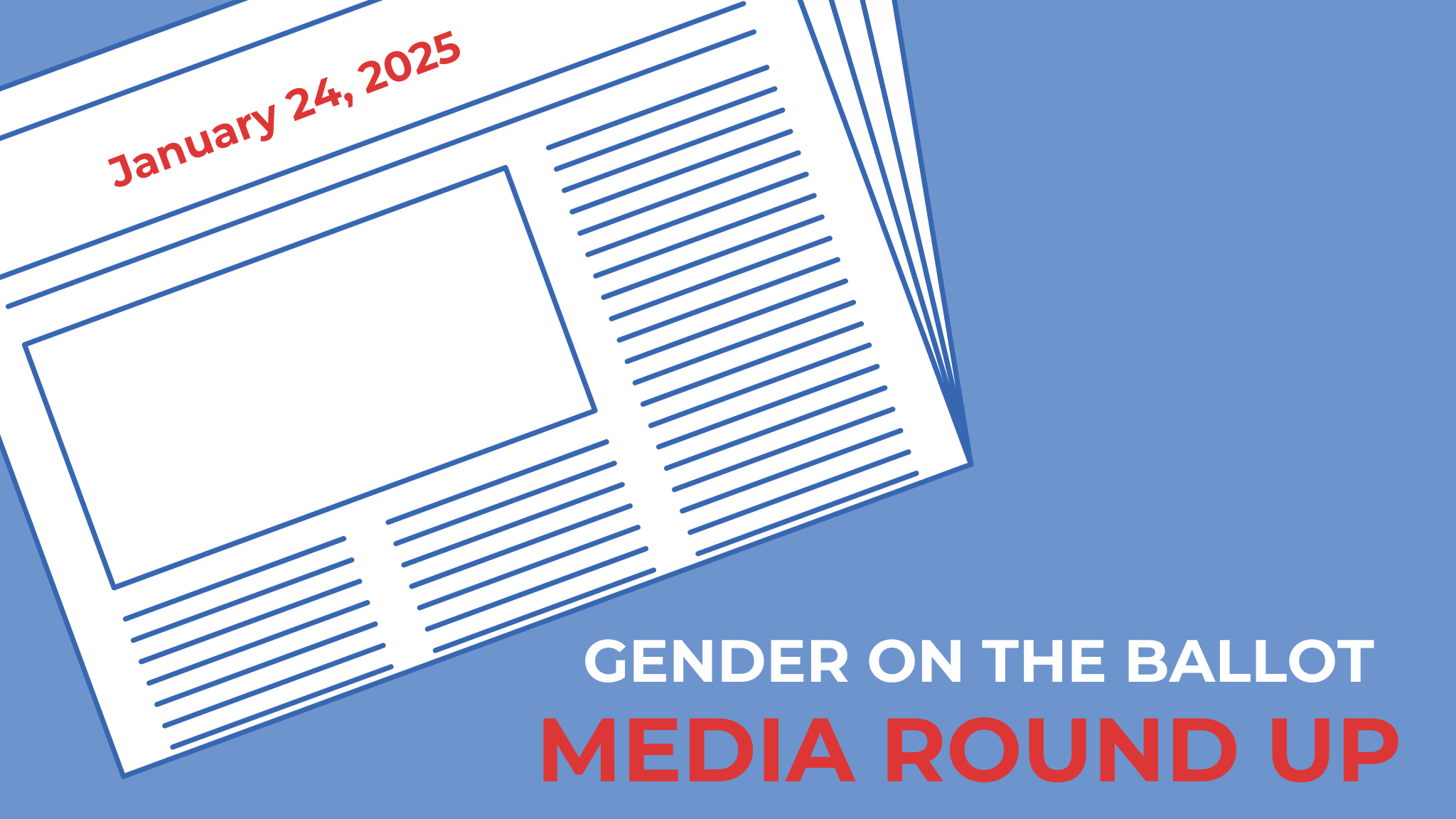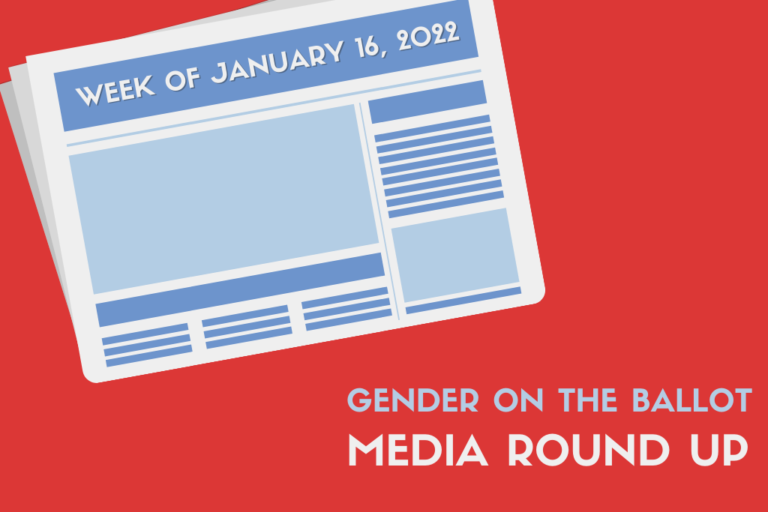Happy Friday! Welcome to our first 2025 Media Round Up. Each week we’re collecting and…
Weekly Media Round Up: January 24, 2025

Happy Friday! Welcome to the Media Round Up. Each week we’re collecting and sharing our favorite gender + politics stories. Supplemental data was provided by the Center for American Women & Politics.
Hitting a paywall? Some sources allow a few free articles without a subscription, and your university or local library may offer free access. For example, AU students, faculty, and staff have access to popular newspapers through the library. Click here to learn more.
Ashley Moody Sworn in as 26th Woman U.S. Senator, establishing new record
Ashley Moody (R-FL) was sworn in by Vice President JD Vance on Tuesday to become the 26th woman serving as a U.S. Senator in this Congress – a record high for women serving in the upper chamber. She filled Marco Rubio’s seat after he was confirmed as Secretary of State. She is the second woman to represent Florida in the Senate, the first being Paula Hawkins (R) in 1981-1987. Before her Senate appointment by Governor Ron DeSantis (R), Moody was Florida’s attorney general starting in 2019. She also served as assistant U.S. attorney for the Middle District of Florida and a circuit court judge from 2007-2017. Moody will be up for reelection in November 2026.
Jocelyn Benson, Michigan’s Secretary of State, Is Running for Governor
The New York Times, Katie Glueck
Jocelyn Benson (D-MI) has announced she is running for the governor of Michigan. She currently serves as Michigan’s Secretary of State, an office she’s held since 2019. Benson declared she will “keep standing up to any bullies or billionaires who try to deceive us, divide us, take away our rights or deny anyone the opportunity to get a fair shot.” This comes after she was the subject of armed protests outside her home after the 2020 presidential election. The race is sure to be tight as other prominent state Democrats are running, with current Lieutenant Governor Garlin Gilchrist II and Detroit Mayor Mike Duggan. If elected, Benson would fill the seat of current Governor Gretchen Whitmer (D). Whitmer is term-limited and plans to not endorse anyone in the gubernatorial race.
The Executive Branch’s Profound Impact on Gender & Representation
President Trump has signed an executive order banning all federal diversity, equity, and inclusion (DEI) programs. This has led to all federal employees in DEI offices, across any agency, to be placed on paid administrative leave effective immediately. The Department of Defense and Department of Health and Human Services are just two major agencies with DEI offices. President Trump signed another controversial executive order on Monday that declares the U.S. government only recognizes two genders, male and female. This has sparked fear and uncertainty for nonbinary and transgender people across the country. Shawn Thomas Meerkamper, an attorney at the Transgender Law Center, explains “it directs all of the federal agencies in the executive branch to adopt new policies that pretend as if transgender people don’t exist.” Federal documents like passports and visas are now subject to change under the formal recognition of only two genders.
Strategies Shift but Endure, with Changing Political Landscape
Reactions to Donald Trump’s second ascendancy to the presidency have shifted in tone, relative to his first administration. While 2017 Trump opponents organized the infamous Women’s March, protested in droves, and channeled their outrage into progress at the ballot box during the 2018 midterm elections, the shift in mood in 2025 has been “significant,” with many in the former resistance reportedly feeling “disillusioned” and “exhausted.” Still, hope remains: on only the second day of Trump’s administration, Bishop Mariann Edgar Budde – the first woman to serve as the spiritual leader of the Episcopal Diocese of Washington – directly pleaded with the president on behalf of immigrants and the LGBTQ+ community, urging him to “have mercy upon the people in our country who are scared now.”
How a Monument to Women Finally Won a Place on the National Mall
The New York Times, Jennifer Schuessler
The 118th Congress recently passed legislation allowing a monument dedicated to American women to be built on the National Mall. The planned monument, which grew out of an earlier effort to have a design originally submitted for Central Park, will be the first on the Mall honoring women and their history. It could also, unfortunately, be the last, given a 2003 law banning new monuments there. Estimates suggest that the project will be ready for unveiling in 2030 or 2031, but first the Women’s Suffrage Centennial Commission must continue to fundraise, select a site on the Mall for the monument, and host a national design competition. Sen. Marsha Blackburn (R-TN), who co-sponsored the bill with Sen. Tammy Baldwin (D-WI), said that the “Women’s Suffrage National Monument will give the women who pioneered the way for future generations the recognition they deserve on the National Mall.”
Cecile Richards Never Flinched
TIME, Ilyse Hogue
Cecile Richards, who served as the president of both the Planned Parenthood Federation of America and the Planned Parenthood Action Fund, passed away on Monday at 67 after a battle with brain cancer. During her illustrious career, Richards – daughter of Texas Gov. Ann Richards (D-TX) – worked for Rep. Nancy Pelosi (D-CA) on Capitol Hill, founded the civic-engagement organization America Votes, and defended women’s reproductive rights “with the zealousness of a missionary and the certainty of an oracle.” Though some initially deemed her aggressive warnings about the state of abortion care “hysterical,” her beliefs were “apparently prescient” as attacks on reproductive freedoms increased under President Barack Obama’s second term and then reached a pinnacle when the Supreme Court overturned Roe v. Wade. Richards leaves a “legacy of fearless service” for generations of young women to come.
Are Female Politicians Better Advocates for Their Districts?
The Source, Chris Woolston
A paper recently published in the American Journal of Political Science found that women in the U.S. House of Representatives were “especially likely” to discuss their own districts when speaking on the congressional floor. Jaclyn Kaslovsky and Pamela Ban, co-authors and researchers of the paper, collected transcripts from 1998-2018 House hearings, creating a dictionary of phrases that suggested local advocacy. Overall, they found that female representatives were more likely than their male counterparts to use words and phrases that referenced local issues. Kaslovsky indicated that several factors could be driving women to serve as stronger advocates for their home districts: “Women face a lot of barriers entering politics, so they feel pressure to deliver for their constituents. They procure more funds for the district but also sponsor more legislation,” she said.
Collins and Murkowski Reemerge as Trump foils
Politico, Jordain Carney
Senators Susan Collins (R-ME) and Lisa Murkowski (R-AL) have broken party ranks to vote against advancing Pete Hegseth’s nomination as Secretary of Defense. During President Trump’s first administration, the two women were frequent voters against Trump-backed legislation, including judicial nominees and healthcare plans. They also voted to convict him of impeachment charges after the capitol attack on January 6, 2024. Murkowski cited Hegseth’s “lack of judgment” regarding infidelity as part of the reason for her vote. Collins echoed a similar sentiment, saying he does not have the “experience and perspective” to succeed. They are the only two Republicans to break party lines in Hegseth’s nomination.






